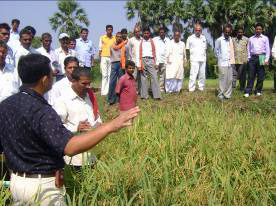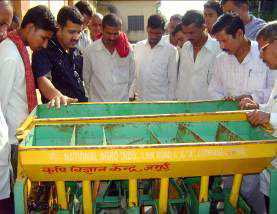 Three years of sowing experience with conservation agriculture (CA) practices in a rice-wheat system at an agricultural outreach station (KVK) in the Jamui district of Bihar State in India have been successful. So far, results show that dry, direct-seeded rice or transplanted rice on permanent beds give higher yields than other crop establishment methods, said KVK agronomist P.K. Singh to visitors during a CA farmer’s field day.
Three years of sowing experience with conservation agriculture (CA) practices in a rice-wheat system at an agricultural outreach station (KVK) in the Jamui district of Bihar State in India have been successful. So far, results show that dry, direct-seeded rice or transplanted rice on permanent beds give higher yields than other crop establishment methods, said KVK agronomist P.K. Singh to visitors during a CA farmer’s field day.
Held on 19 October 2009, the event included 50 farmers, 10 service providers, and 9 representatives from the Bihar State Department of Agriculture. KVK’s program coordinator, R.N. Singh, opened the event with remarks on how increasing input costs and labor shortages are pushing up the cost of rice production in the predominantly rice-growing districts of Jamui and Lakheesarai. CA-based practices, he emphasized, are one way farmers can cut costs and improve yields, making farming more sustainable and economically viable. The district agricultural officer, Manoj Kumar, added that the introduction of winter maize will help diversify the current rice-wheat systems and will also improve productivity. He concluded with information about the government’s initiatives for and increased supply of quality seed and more mechanization.
 Later in the day, farmers viewed various plots sown with different CA practices, during which they asked questions and saw CA machinery demonstrations. Dry, direct-seeded rice with anchored residues in a permanent no-till system caught the attention of many participants, along with the high-yielding, unpuddled transplanted rice on permanent beds. Farmers also discussed weed management practices for various crops with Ravi Gopal, agronomist for the Cereal Systems Initiative for South Asia (CSISA). The event was part of CSISA’s delivery objective for the central Bihar Hub.
Later in the day, farmers viewed various plots sown with different CA practices, during which they asked questions and saw CA machinery demonstrations. Dry, direct-seeded rice with anchored residues in a permanent no-till system caught the attention of many participants, along with the high-yielding, unpuddled transplanted rice on permanent beds. Farmers also discussed weed management practices for various crops with Ravi Gopal, agronomist for the Cereal Systems Initiative for South Asia (CSISA). The event was part of CSISA’s delivery objective for the central Bihar Hub.

